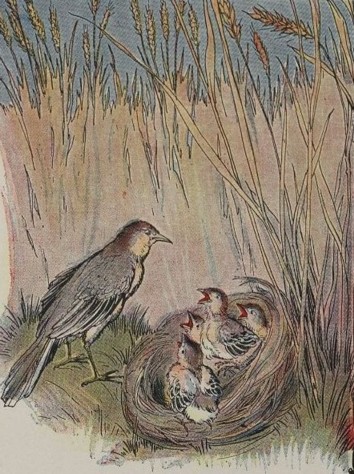| 1. wheat | /weet/ |
| -a plant whose yellowish-brown grain is used for making flour, or the grain itself | |
| My grandfather used to own a wheat field. | |
| 2. reap | /reep/ |
| -to cut and collect a grain crop | |
| Farmers nowadays still reap crops traditionally. | |
| 3. hail | /heyl/ |
| -a hail of things, usually small objects, is a large number of them that hit you at the same time and with great force | |
| The hail of arrows from the castle tower looks like rain from afar. | |
| 4. rustle | /RUHS-uhl/ |
| -if things such as paper or leaves rustle, or if you rustle them, they move about and make a soft, dry sound | |
| I can hear the bushes rustling behind us, be careful. | |
| 5. flutter | /FLUHT-er/ |
| -to make a series of quick delicate movements up and down or from side to side | |
| Every summer, stray birds flutter about near my window. |

“This wheat is now ready for reaping,” said the Farmer. “We must call in our neighbors and friends to help us harvest it.”
The young Larks in their nest close by were much frightened, for they knew they would be in great danger if they did not leave the nest before the reapers came. When the Mother Lark returned with food for them, they told her what they had heard.
“Do not be frightened, children,” said the Mother Lark. “If the Farmer said he would call in his neighbors and friends to help him do his work, this wheat will not be reaped for a while yet.”
A few days later, the wheat was so ripe, that when the wind shook the stalks, a hail of wheat grains came rustling down on the young Larks’ heads. “If this wheat is not harvested at once,” said the Farmer, “we shall lose half the crop. We cannot wait any longer for help from our friends. Tomorrow we must set to work, ourselves.”
When the young Larks told their mother what they had heard that day, she said: “Then we must be off at once. When a man decides to do his own work and not depend on any one else, then you may be sure there will be no more delay.”
There was much fluttering and trying out of wings that afternoon, and at sunrise next day, when the Farmer and his son cut down the grain, they found an empty nest.
Self-help is the best help.
| 1. | From whom was the Farmer about to ask help to reap the ripe wheat? |
| 2. | What did the young Larks tell their Mother Lark when she came home? |
| 3. | What did the Farmer and his son see on the day of the wheat’s harvest? |
| 1. | How did the Farmer handle the situation? |
| 2. | If the Larks and their Mother did not leave their nest, what do you think the Farmer and his son would do? |
| 3. | “When a man decides to do his own work and not depend on any one else, then you may be sure there will be no more delay.” Do you agree with this? Why or why not? |
| 4. | How do you define self-help? |
| 5. | What must we do in order not to depend on others at most times? |
| Grammar 文法 |
Pronunciation 発音 | Vocabulary 単語 |
Comprehension 理解 |
|
|---|---|---|---|---|
 GOOD GOOD |
文法の誤りはほとんどなく、完全な文章で話すことができる | ほとんどの単語をはっきりと正しく発音することができる | 習った表現を適切に使うことができる | 文章を理解し、質問に正しく答えることができる |
 FAIR |
文法の誤りはあるが、完全な文章で話すことができる | 発音の練習が必要な言葉がいくつかある | たまにミスはあるが、習った表現を適切に使うことができる | 文章を完全に理解するのは難しく、質問に正しく答えられないときもある |
 POOR |
文章で話すのは難しく、単語だけで話すことができる | 発音の練習が必要である | 習った単語と表現を少しだけ使うことができる | 文章を理解するのは難しく、質問に答えるのは難しい |
An eBook from The Project Gutenberg.
This eBook is for the use of anyone anywhere at no cost and with almost no restrictions whatsoever. You may copy it, give it away or re-use it under the terms of the Project Gutenberg License included with this eBook or online at www.gutenberg.org